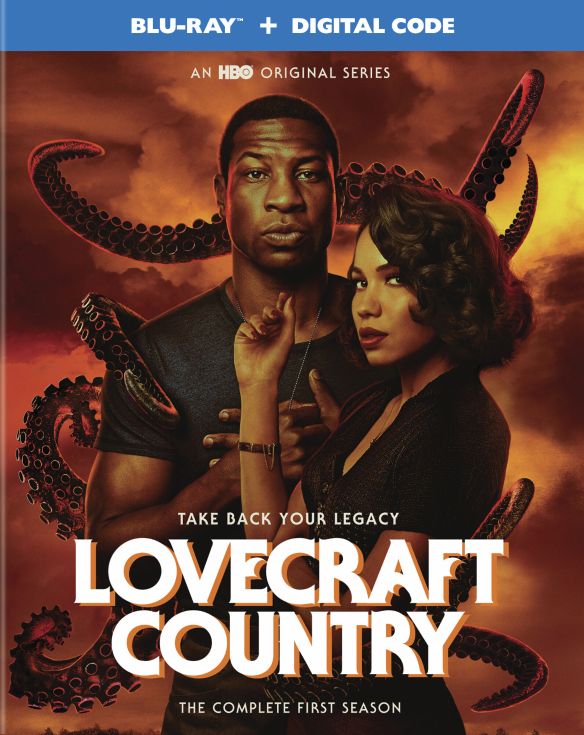
The first five minutes of HBO’s adventure horror series, Lovecraft Country (Season One), tells you everything you need to know about it. Sitting at the back of a bus in 1950s America, Atticus “Tic” Freeman (Jonathan Majors), a Korean War vet, dreams of ball hitter Jackie Robinson taking on a battlefield of laser-shooting aliens and Lovecraftian beasts. Tic wakes, the bus breaks down, and he and a fellow black passenger must walk to the closest station. Reality and surrealness co-exist in a landscape that swarms with bigoted monsters.
As it began airing last summer, Lovecraft Country was very much of the moment. Racial animus in America had reached a boiling point, convincing this writer that not only are the injustices of the past far from behind us, we may never rise above them. I hope to God we do, of course. And Lovecraft Country is, to its credit, as hopeful as it is outraged—horrified by the legacy of an all-pervasive, systemic racism, yet boldly appropriating the pulp tropes and narratives of 20th Century America to its cause.
For this reason, Lovecraft Country—adapted from the 2016 Matt Ruff novel by showrunner Misha Green—feels urgent. Sadly, even though it has enough momentum and pulp (e.g., extreme violence and graphic sex scenes) to keep genre fans busy checking off the various influences that drive its appeal (e.g., Harry Potter and Indiana Jones films, and H.P. Lovecraft’s horror fiction, among others), the show is overripe and tonally confused. Any promise the brilliant premise has—infusing Lovecraft’s brand of cosmic horror (now read by many as racist, xenophobic, and anti-Semitic) with an unflinching look at heroic and nerdy black lives in the time of Jim Crow—is undercut by the show’s persistent habit of reminding us it wants to reinvent or deny old horror tropes.
And damn near each episode introduces a unique spin on the horror genre. In episode three, “Holy Ghost,” the characters reckon with a haunted house. Episode four, “A History of Violence,” takes us on a National Treasure-like journey to the bowels of a museum. By the time episode five, “Strange Case,” arrives, we are deep into body-swapping horror (and it’s a very good installment).
Beneath all this, Tic and others grapple with a confusing mix of secret pagan rituals and archaic languages and totems. They also stand up to a bevy of white racists (anyone that looks Caucasian, badge or no badge). These folks are so outwardly evil that you’re unsure whether to take it as shrill caricature or representative of just how sick many people used to be, and still are. The overall effect becomes self-defeating. By bludgeoning the viewer with overt racism, Lovecraft Country softens the impact it could (or should) have. Each turn of the story, every violent encounter, no matter how wild or fantastic, ends the same—as proof of the inescapable torment of discrimination.
This approach, of course, has immense value. No easy or safe answers to the gross behavior on display exist; and Lovecraft Country is smart enough to present us with fleeting moments of grace and happiness for its characters, even as it hammers home (again and again) the futility and frustration of thinking you can out-run and out-think the actual monsters.
“Sundown,” the pilot episode, gets things off to a simple, impressive start. Tic travels to Chicago to find his father, Montrose (Michael K. Williams), with whom he has had a strained relationship. Ostensibly gathering information for The Safe Negro Travel Guide that his uncle George (Courtney B. Vance) publishes, Tic—upon hearing Montrose might be in Massachusetts, trying to dig up information on Tic’s deceased mother—goes on a road trip with George and a childhood chum, Leti (Jurnee Smollett). Tic and family are fans of science fiction and Lovecraft’s stories. But the horrors of the printed page are an even match for the uglies they meet, including a white cop who tells them they’re in “sundown country” and accuses them of robbery. Abruptly, a toothy team of Lovecraftian shoggoths appear from the forest nearby and a bloody slaughter ensues. The buildup here is delightful, worthy of the show’s intent to add visceral thrills to social commentary.
What follows, though, in episode two, “Whitey’s on the Moon,” is a convoluted storyline that involves the Braithwhites, a rich, magical family of bigots. The tone and various plot complications jump, pivot, and veer. I applaud the show’s desire to center on brainy black characters we almost never see portrayed (e.g., scientists and science-fiction fans). I welcome its unabashed portrayal of the blatant racism and discrimination suffered. Still, the core cast of heroes doesn’t register. Full of emotion but oddly lacking substance, they are underdeveloped as people. The show’s insistence on critiquing widespread racism short-changes them. The rest of the series (not without its share of great acting and FX, or incredible costumes and set design) becomes a test of endurance.
To be sure, beautiful, even validating moments trickle throughout the 10 episodes of Lovecraft Country (e.g., Tic and Montrose coming to terms with Montrose’s queerness; the way Leti and a house of revelers strike back at racists who tie bricks to their steering wheels). Episode seven, “I Am,” belongs to George’s wife, Hippolyta (Aunjanue Ellis). It’s the show’s sole sustained dip into wonder and awe. Unfortunately, the series, a dense, colorful tease, upends expectations too well. Beyond a few scattered points, the scares never arrive, the under-represented heroes never much come to life, and the jumbled mythos they explore never coheres.
Special features on the Warner Bros. Blu-ray include three featurettes and a brief collection of interviews with the cast and crew. The first featurette, “Orithyia Blue and the Imagination of Diana Freeman,” looks at the graphic novel one character creates. The second featurette, “Lovecraft Country: Compendium of Horrors,” focuses on the show’s gothic imagery. The last featurette, “Crafting Lovecraft Country,” examines the efforts the production team made to world-build.